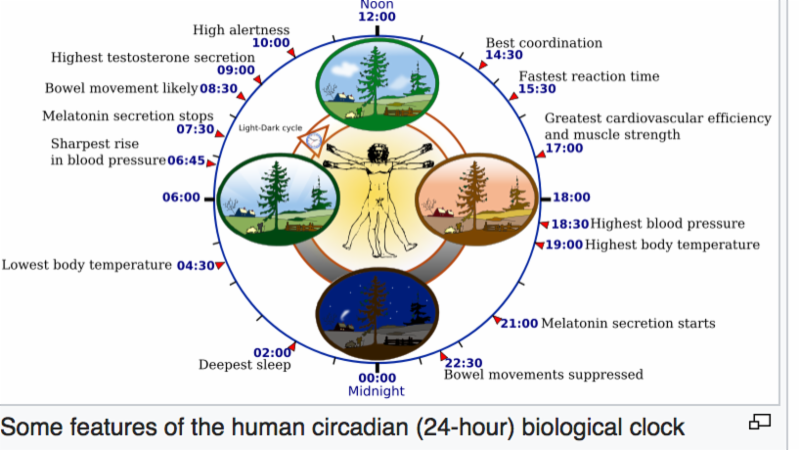Circadian Timing: Vital to Us and the Microbes Living in Us
Circadian rhythms are the 24-hour cycles of physiological processes that take place in all living things, including fungi, cyanobacteria, plants, insects, animals and humans. These rhythms are important in the sleeping and eating patterns of all creatures, and in humans their influence ranges from moods, metabolism and obesity to health and illness, mental acuity and the performance of sports teams.
Scientists at Harvard, Stanford, and the University of California, San Diego, analyzed 40 years of NFL of games between East Coast and West Coast teams, and found that teams from the West seem to have a clear advantage over their East Coast competitors when they play games that start after 8 PM ET. A story by Michael J. Breus in Psychology Today explains that all of us have preferred times for different activities, depending on our own circadian clocks. Mid morning is often associated with peak cognitive function, he writes, and late afternoon and early evening are associated with peak athletic performance, when the body temperature is highest and speed, strength and flexibility are at their best. Forget the wall clock, Breus writes, those West Coast players who take the field at 8 PM or 9 PM ET are really playing in their biological, circadian late afternoon. He says researchers who studied circadian timing in professional baseball and basketball have found similar results.

Night Shifts Disrupt Circadian Rhythms
Studies have shown also that people who work night shifts or frequently travel abroad, which disrupts circadian rhythms, have higher rates of metabolic diseases, such as obesity, diabetes and cardiovascular disease.
We’ve been told microbes in the gut biome have impact on our metabolism, general health and even our brains. It turns out those gut microbes also have their own circadian rhythms, and new research shows mammalian organisms are highly interconnected with the organisms that live inside them. A story in Neurosciencenews.com says researchers at the Weizmann Institute of Science found circadian changes in the gut microbiome have profound effect the host’s general physiology and tissues far from the gut. Eran Elinav, an immunologists who co-authored a study in Cell magazine, explained gene expression in the liver changes in tandem with gut microbiome rhythms. As a result, he says, disturbances in the rhythmic microbiome can impair such daily liver functions as drug metabolism and detoxification. This knowledge could help physicians know how and when medications could be given most effectively.
Studies in mice, reported in Neurosciencenews.com, show that the gut microbiome regulates fat uptake and storage by “hacking into the circadian clocks present in the cells that line the gut.” Dr. Lora Hooper, Chair of the Department of Immunology at the University of Texas Southwest Medical Center, Dallas, says growing understanding of how the gut bacteria and the body’s circadian clockwork act together to promote fat accumulation may lead to better treatment of metabolic disorders.
Breus says circadian timing is vital in every aspect of our lives. “I’d like to see greater attention paid to circadian timing not only in professional sports,” Breus writes, “but more broadly to how we can all benefit from better aligning our lives, including our work and school schedules, with circadian timing in mind.”
